For better absorption, take fat-soluble vitamins with meals that include healthy fats and consume water-soluble ones like vitamin C on an empty stomach. Your gut health directly impacts nutrient uptake, so maintaining diverse gut bacteria through fermented foods boosts absorption rates.
Strategic timing matters, too. Take energizing B vitamins in the morning and calming magnesium at night. Understanding nutrient synergies and competitive absorption can transform your supplement routine’s effectiveness.
Understanding Bioavailability
Ever wondered why that expensive multivitamin doesn’t seem to make you feel any different? The answer lies in bioavailability. It all comes down to how well your body can take in and use the nutrients from supplements. If absorption doesn’t happen, the benefits won’t either.
Nutrient bioavailability depends on several factors. Your digestive efficiency determines how well you break down supplements. Fat-soluble nutrients like vitamins A, D, E, and K need dietary fat for absorption, while water-soluble nutrients like vitamin C and the B vitamins dissolve directly in water.
Some minerals come as oxides, which absorb poorly, while chelated forms absorb better. Additionally, your age, gut health, and even genetics influence how well you absorb different nutrients.

Fat-Soluble vs. Water-Soluble Nutrients
Not all nutrients behave the same way in your body. Fat-soluble vitamins like A, D, E, and K need dietary fat for proper absorption. Water-soluble vitamins (B-complex, C) and most minerals dissolve in water and enter your bloodstream directly. Your body doesn’t store these, so you’ll need a consistent daily intake.
Different nutrient transport mechanisms determine absorption rates. Fat-soluble nutrients travel through lymphatic vessels, while water-soluble ones use active transport across intestinal walls. Take fat-soluble supplements with your largest meal, and split water-soluble doses throughout the day.

The Role of Gut Health
When’s the last time you considered your gut’s impact on supplement absorption? Your digestive system determines how well nutrients enter your bloodstream. A well-functioning gut lining helps regulate what enters your bloodstream. On the other hand, good gut bacteria produce enzymes that aid in breaking down supplements for better absorption.
Your stomach acid levels directly affect mineral absorption. Low acid means poor iron, calcium, and B12 absorption. Meanwhile, your microbiome influences micronutrient synergy by producing vitamin K and supporting fat-soluble vitamin processing.
To boost gut health and maximize absorption enhancers, you’ll want to maintain diverse gut bacteria through fermented foods and prebiotics. Consider supplement timing around meals to support enzyme production. If you’re experiencing bloating or digestive issues, your compromised gut might be limiting nutrient absorption despite taking quality supplements.
Timing and Meal Pairing
Your gut health sets the stage for absorption, but timing and meal pairing determine whether nutrients actually make it into your cells. B vitamins can cause nausea if you take them without food.
Consider supplement stacking carefully. Iron blocks zinc absorption, while calcium interferes with magnesium. Space competing minerals by at least two hours. Morning works best for energizing B-complex and vitamin D, while magnesium promotes better sleep when taken evening.
Your personalized nutrition plan should factor in digestive enzyme support if you’re taking supplements with meals. Time probiotics away from hot foods and antibiotics. For gut health optimization, consistency matters more than perfect timing.
Supplement Synergy and Stacking
While timing matters for absorption, combining the right supplements creates powerful synergies that multiply their benefits. You’ll enhance supplement absorption substantially when you pair vitamin D with magnesium and K2, as they work together to improve calcium utilization. Similarly, vitamin C boosts iron uptake, while black pepper extract (piperine) can increase curcumin absorption by up to 2,000%.
However, you should avoid certain combinations. Don’t take calcium with iron or zinc, as they compete for the same absorption pathways. Space out high-dose minerals by at least two hours. For wellness optimization, consider taking omega-3s with fat-soluble vitamins A, D, E, and K during meals containing healthy fats.
Enzymes, Binders, and Delivery Systems
In addition to pairing nutrients wisely, the way supplements are delivered greatly affects how well your body can absorb them. Digestive enzymes such as bromelain and papain support nutrient breakdown, enhancing uptake, while piperine can boost the absorption of certain ingredients like curcumin by as much as 2000%.
Modern delivery systems make a significant difference. Liposomal formulations wrap nutrients in fat molecules, protecting them from digestion and enhancing cellular uptake. Time-release capsules guarantee steady nutrient delivery throughout the day, preventing waste through excessive single-dose amounts. Enteric coatings shield delicate nutrients from stomach acid so they can pass safely to the small intestine for absorption.
These technologies are especially beneficial for nutrients with naturally poor absorption rates, like CoQ10, curcumin, and certain B vitamins.
Lifestyle Factors That Affect Absorption
Even if you’re taking the highest-quality supplements with advanced delivery systems, certain lifestyle habits can markedly undermine their effectiveness. Your hydration status directly impacts nutrient transport. Dehydration slows absorption and cellular uptake. Chronic stress elevates cortisol, which impairs digestive function and reduces stomach acid production, both essential for breaking down supplements.
Alcohol consumption damages the intestinal lining and depletes B vitamins, while certain medications like antacids and antibiotics interfere with nutrient absorption. Your sleep quality matters, too. Disrupted circadian rhythms affect hormone production that regulates nutrient metabolism. Even excessive caffeine can block iron and calcium absorption.
To maximize supplement effectiveness, prioritize adequate water intake, manage stress through proven techniques, limit alcohol, and maintain consistent sleep patterns. Time caffeine consumption away from supplement doses for ideal results.

Tracking Effectiveness and Making Adjustments
Taking supplements without monitoring their impact is like driving with your eyes closed. Persistent fatigue, brittle nails, slow wound healing, or unchanged symptoms despite consistent supplementation are signs that your body isn’t absorbing nutrients properly.
Annual blood work provides concrete data about your nutrient levels. Request extensive panels that include vitamin D, B12, iron, and magnesium. Compare results before and after starting supplements to gauge effectiveness.
Keep a symptom journal, noting energy levels, mood, and physical changes. If you’re not seeing improvements after 8-12 weeks, it’s time to adjust your approach. Consider consulting a functional medicine practitioner or nutritionist who can interpret your lab results and create a personalized absorption strategy based on your unique biochemistry.
Frequently Asked Questions
Can I Take All My Supplements at Once for Convenience?
You shouldn’t take all the supplements together. Some compete for absorption, while others need specific timing. Fat-soluble vitamins require food, water-soluble ones often work on an empty stomach, and certain minerals can block each other’s uptake.
Are Liquid Supplements Better Absorbed Than Pills or Capsules?
You’ll often see better absorption with liquid supplements since they bypass the breakdown processes pills require. However, quality matters more than form – some well-designed capsules with enhanced delivery systems can match or exceed liquid absorption rates.
How Long Should I Wait Between Taking Different Supplements?
You’ll typically want to wait 2-4 hours between competing supplements like calcium and iron. However, you can take complementary nutrients like vitamin D and magnesium. Always check specific interactions for your supplement combination.
Do Expired Supplements Have Reduced Absorption Rates?
Expired supplements don’t necessarily have reduced absorption rates, but they’ll likely have degraded potency. You’re absorbing less because there’s less active ingredient available, not because your body can’t process what remains. Check expiration dates carefully.
Can Children Absorb Supplements the Same Way as Adults?
No, children’s bodies don’t absorb supplements the same way. They’ve got different digestive enzyme levels, stomach acid production, and metabolic rates. You’ll need age-appropriate formulations and dosages since their developing systems process nutrients differently than adults.







